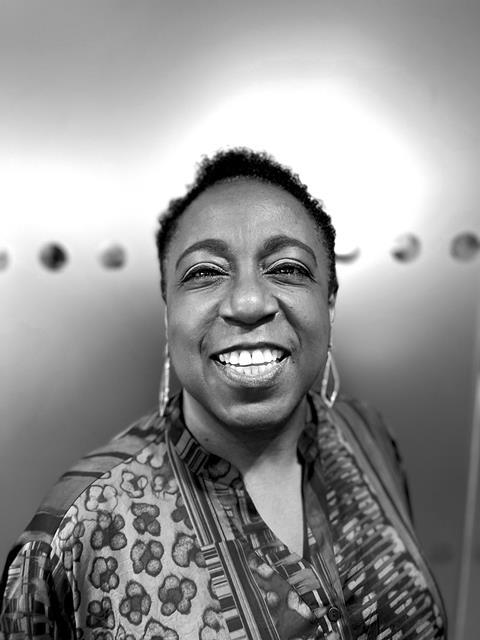After a fast-paced career in FTSE 100 and global companies, Yetunde Hofmann was told there was no place for love in business, but has been led by her faith to embrace it as a leadership model.

When did you first discover that leadership was for you?
I think we all are born leaders; whether you’re ruling a nation or sleeping on the streets, we all are leaders. When making decisions we’ve got to be accountable and responsible.
In 2021 you founded Solaris, a leadership development programme for black professional women. What prompted you to start it?
The murder of George Floyd on 25 May 2020 was the trigger point. I couldn’t sleep for days. I wrote to all the leaders I knew in organisations and asked: “What are you doing? What’s your business doing?”
I got the responses: “We’re trying to do this, trying to do that,” but I still couldn’t sleep. My husband said to me: “Well, if, you can’t sleep, and you feel this way, then you’ve got to do something about it.” I wondered: “What can I do?”
First of all, there’s very little representation of people that look like me at the most senior levels. For every 100 men promoted into management positions, only 58 black women are. We all know that representation counts; role models count.
Emotional intelligence and social intelligence cannot be demonstrated effectively if they are not underpinned by love
I’ve got a network that I can call on, of people who don’t necessarily look like me, but who are willing allies and supporters wanting to bring change. And so Solaris was born in April 2021 – a pioneering new leadership development programme for black women that has a single aim: to break the black glass ceiling.
I decided to unashamedly target women who identify as black in middle management where it’s so difficult to advance beyond that place. The programme helps tackle the inequality at management, CEO and board level, enables organisations to become more inclusive at every level and generate a strong internal talent pool of black women.
You gave a TED talk where you answered the question: “Why not see love in business?” Most leaders don’t seem to value what could be called soft skills.
The soft skills are really the hard skills when you think about it. What is it that brings dysfunction? It’s always the way a person behaved towards another; a communication problem or some unkindness. I did the TEDx talk in 2015, at the AI business school in Madrid. And the response of my peer group to my suggestion of bringing love into business was: “That’s not possible.” But I was so encouraged by the response of people much earlier in their careers.
I define love as that unconditional acceptance of who I am, warts and all, and the unconditional acceptance of all of who you are. Because if I’m able to do that, it means I can see beyond what you do or have, and appreciate the human being that you are. I can see that you are more than just the colour of your skin, what you do or what you say you are.
Since 2015, things have improved. People are talking about kindness, compassion and being willing to listen. We have an understanding of emotional intelligence and social intelligence, which, by the way, cannot be demonstrated effectively if they are not underpinned by love.
the response of my peer group to my suggestion of bringing love into business was: “That’s not possible.”
How can you be kind if you don’t have love at the root? How can you demonstrate compassion, if you don’t have love at the root? So, in my view, love is going to become more and more desired, and more and more a non-negotiable in the world of work.
I once heard a Christian leader say: “What puts people off Christianity is Christians.” But what makes people interested in Christianity is also Christians. We’ve got to find our way and find out what it means to really love as Christian leaders.

You have seen examples where loving business has been functioning well. Can you tell us about one?
I remember years ago, even before I started talking about love in business, my mother died. The person I was working for at that time, without any hesitation, said: “We’re going to put you on a plane at the company’s expense, so that you can be there for the burial.”
All expenses were paid – the car that picked me up, the flights, everything. That for me was love.
I think it’s true to say that in order for us to be loving in our leadership, we need to receive the love of God ourselves, and to be at peace and in a place of joy.
What do you do to recharge?
The first thing I do is pray. I’ve found prayer an opportunity to recharge and to connect with who I am and what I am about. I’m a cancer survivor. When I was very ill, and going through treatment, prayer was a place of solace and comfort. Secondly, I play the piano. I’m a classical pianist and playing the piano requires such concentration that there’s no room to think of anything else. Therefore the minute my mind wanders, I make a mistake. Immersing myself in playing the piano is amazing. My singing isn’t great, so only when I’m on my own do I sing worship songs, dance and really enjoy myself. And finally, of course, spending time with my husband, just the two of us.
You’ve written a book Beyond Engagement. One of the reasons for writing the book was that you have been impacted by other books wasn’t it?
I read a lot of books, but in the early stages of my career one book that really impacted me was Stephen Covey’s The Seven Habits of Highly Effective People. It’s not a Christian book, but you can relate to everything. He talks about self-levelling and starting with the end in mind.
In order for us to be loving in our leadership, we need to receive the love of God ourselves
The best book is the Bible. It will show you some really clear ways of how to navigate your way as a leader. I find it is rich; you can lead your life through it, you can run a business with it, you can run a relationship with it. I mean, it’s just amazing. When I read the Bible, I learn something new every day. It’s got humour in it, it’s got encouragement, it’s got storytelling, it’s got hope. It gives me confirmation of who I am and where I’m going.
What is your book about?
It is a book that helps you understand the impact and the difference that love can make in business, through the eyes of over 30 business leaders from all walks of life, and different parts of the world. They are grappling with what it means, how they would define it, what difference it would make, and then the practical tools that can be used to develop leaders and the barriers that could potentially happen and how you can break down those barriers. It’s a book of encouragement. It’s motivating.
When you really come at it, the greatest gift and need that organisations have is love.
Yetunde Hofmann is a board level executive leadership coach and mentor and global diversity and inclusion expert. She is the founder of Solaris – a pioneering movement empowering black women to become leaders. She is managing director of Synchrony Development Consulting – international leadership and change consultancy – and managing director of The Enjoyable Life Series CIC – a community organisation that runs events to build community and raise money for charities. For more information visit: yetundehofmann.com






























No comments yet